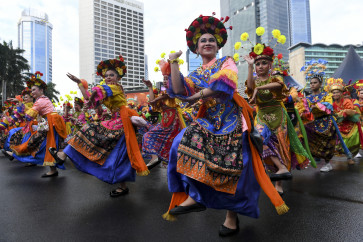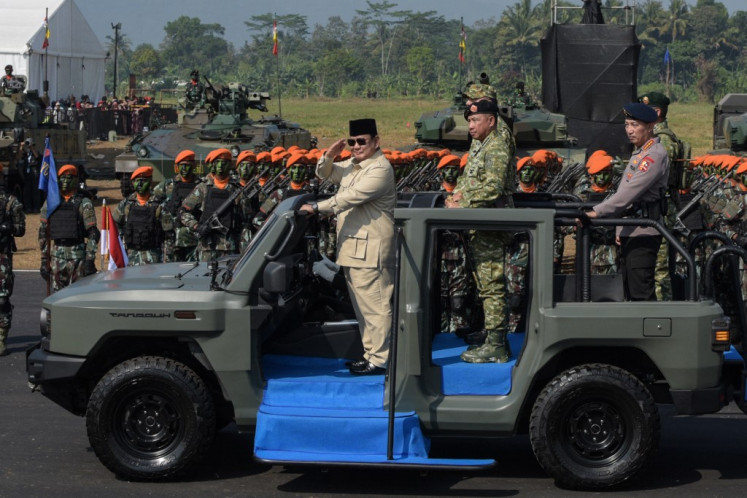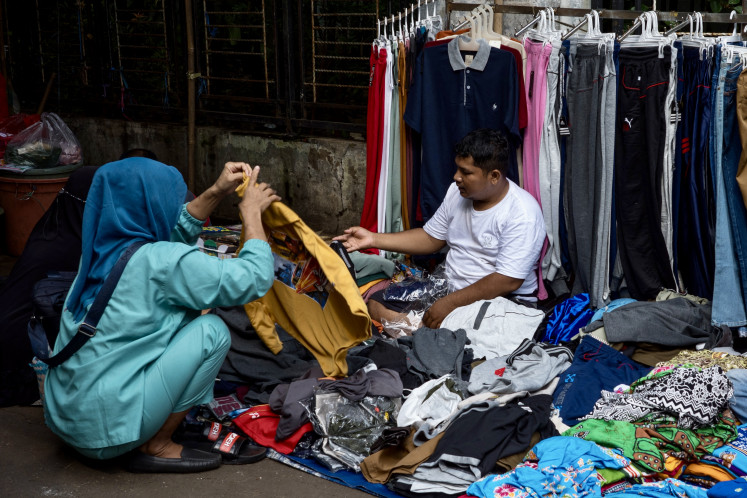Popular Reads
Top Results
Can't find what you're looking for?
View all search resultsPopular Reads
Top Results
Can't find what you're looking for?
View all search resultsIndian leader remembered for charity, nonviolence
Students, teachers and members of the international community commemorated the 145th anniversary of revered Indian leader Mohandas Karamchand Gandhi, or Mahatma Gandhi, at the Gandhi Memorial International School (GMIS) in Central Jakarta on Thursday
Change text size
Gift Premium Articles
to Anyone
S
tudents, teachers and members of the international community commemorated the 145th anniversary of revered Indian leader Mohandas Karamchand Gandhi, or Mahatma Gandhi, at the Gandhi Memorial International School (GMIS) in Central Jakarta on Thursday.
An 8th grader at the school, Hrindashu, told The Jakarta Post that many remembered Gandhi as an advocate of nonviolent civil disobedience.
'He believed in nonviolence and that's cool. Many Indian leaders say that Mahatma Gandhi is their role model for righteousness and his beliefs about peace are still relevant with so many conflicts still happening in the world today,' Hrindashu said.
Hrindashu, who is originally from India, added that he had once visited Gandhi's home in India and his visit had magnified his admiration for the leader.
The celebrations opened with the school choir singing Gandhi's two favorite hymns ' 'Raghupati' and 'Vaishnava Janatho' ' and were peppered with several traditional Indian dances from different nationalities by students and teachers in spangly, brightly colored clothes.
Born in Gujarat, western India, on Oct. 2, 1869, Gandhi was the preeminent leader of the Indian independence movement in British-ruled India. He first launched a movement of peaceful resistance, Satyagraha, in South Africa on Set. 11, 1906. The movement created a sequence of events that led to the political liberation and creation of representative democracy in India, South Africa and in many post-colonial and developing countries. One of his moist famous feats was leading Indians in challenging the British-imposed salt tax with the 400 kilometer Dandi Salt March in 1930.
Apart from his advocation for nonviolence, Gandhi was also known for his firm belief in pluralism, his modest living and charity work.
During the event, the school also donated funds and sembako (basic commodity packages) to several organizations, such as the National Child Sponsorship Movement (GNOTA) and the Indonesian Care for Cancer Kids Foundation (YKAKI), to provide for children's education. According to GMIS chairman Suresh G. Vaswani, the school had been actively giving charity to the needy as a way to teach their students Gandhi's thoughts on giving.
'Not only do we give to charity, but we also make our students visit orphanages and the residences of the needy in Jakarta so that they can interact with them. We want to teach them what Gandhi taught us, that you never know who is more fortunate and who is less fortunate and that everyone should be treated with kindness and that sharing is a way of life,' he said.
Vaswani added that Jakarta residents could also learn a lot from Gandhi because of his belief in pluralism and multiculturalism.
The commemoration in Jakarta was also attended by several foreign emissaries, including the Indian Ambassador to Indonesia, Gurjit Singh.
'Mahatma Gandhi is known as the father of India, he is such a revered character that his birthday is one of only three national holidays in India. It shows how much he has contributed to the world, too, as the United Nations established this day as an International Day of Nonviolence in 2007,' Singh told the Post.
Singh added that he believed Gandhi's teachings would also resonate with Indonesians as the leader was against colonialism.
'Indonesia is an inherently peaceful country that fought hard against the colonial powers, much like India. Gandhi's teaching of peace and simplicity is one both of our countries can hold on to for a long time,' he said. (fss)










